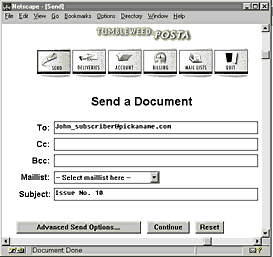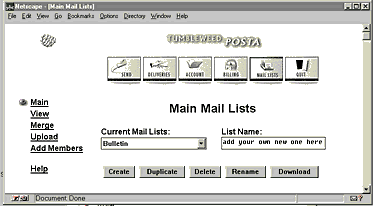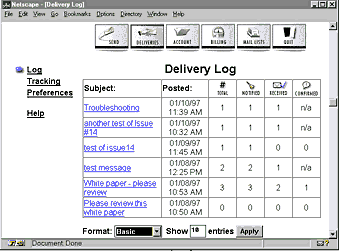January 17, 1997
Posta: FedEx for the Net?
Financial printers test Tumbleweed's method of making Net delivery reliable for formatted pubs
Tumbleweed, developer of the nearly forgotten Envoy portable document software, recently introduced an innovative document-delivery technology of interest to both publishers and service providers. Called Posta, it provides a more reliable method than E-mail attachments for delivering formatted documents securely over the Internet.
Posta is currently undergoing alpha testing with a handful of key customers and should be released within a couple of months.
The premise of Posta is to use E-mail to notify someone that a document has been delivered, but to use the Web to deliver the actual content. Its notification messages are pure ASCII, using the Simple Mail Transport Protocol (SMTP) of the Internet. Formatted documents are uploaded and downloaded through the Hypertext Transport Protocol (HTTP) of the Web.

The sender, using the Posta client, sends a document (any file, any format) and address to a Posta server through an HTTP connection. The server stores the document on a Web server and forwards an E-mail to the recipients. The E-mail message contains the URL of the document. The recipients paste the URLs into their browsers and, voilà, they receive the document through the HTTP protocol of the Internet. (Reading the document requires that the recipient have software that recognizes the data format. Posta supports the Envoy format, but it does not require it; files can be any format you like, including Envoy's competitor, Acrobat.)
Posta server. The Posta server may be run by an Internet service provider looking for a new service to offer or by a publisher seeking a more universal delivery mechanism for publications mailed electronically to subscribers. The Posta server tracks when a document was sent and when the recipient was notified. If you want acknowledgment of receipt, the Posta server will automatically create an acknowledgment button on the HTML cover page of the document, and when the recipient clicks the button, record the acknowledgment in its tracking system.

Using straightforward HTML forms, publishers or service providers (those with the Posta client) set up accounts and mailing lists on the server. Existing subscriber lists (in E-mail form) can be uploaded and named.

The tracking system is a database application, written to work with any ODBC-compliant database. At this point Tumbleweed says it knows it works with Microsoft SQL server and Oracle databases. The Posta server itself runs on Windows NT and interfaces to Microsoft's NT Web server and to Netscape's NT and Unix Web servers.
The Posta server is sold on a per-seat basis, with a minimum of 20 users (those allowed to send documents) at a price (as yet undetermined) between $100 and $200 per seat. At a publisher wishing to use it for mailing publications, Tumbleweed would likely set a fixed cost. Tumbleweed also offers a pricing model for service providers that may want to offer the service to hundreds or thousands of users who may only use the service occasionally. The cost of running the Posta server in such a case can be based on transactions or licenses.
Financial printing test. Three of Tumbleweed's first customers are Donnelley, Merrill and Bowne, the three largest financial printers in the United States. Like other commercial printers, these firms are under constant pressure to improve their turnaround times, while still maintaining the confidentiality of the customer's information.
In the past, the printers have relied on courier services to deliver proofs. Under a pilot program, all three printers are testing Posta.
James Loadholt, Internet specialist at Bowne Business Communications, said his firm is testing the use of Posta for delivering Acrobat proofs of annual reports and other documents the firm typesets. "Posta's tracking of deliveries is an improvement over FTP," Loadholt said, but he also would like to see the product enhanced to accommodate other forms of notification, even phone conversations.
What makes Posta different? Tumbleweed has recognized that the delivery of formatted documents electronically remains less than 100% reliable, which is why so many of us continue to use fax and courier services, and why so many publishers (ourselves included) have to offer un-formatted ASCII versions of their electronically mailed publications. Netscape, with its Inbox technology, is counting on the SNMP pipe to deliver content. It's great if everyone uses Communicator; not very reliable if any of your recipients don't. As a result, most formatted documents travel as attachments, with success rates far below those of fax machines or courier services. Marimba and others are setting up new pipes (they call them channels) for formatted content; we think these will make sense for certain types of content, but they are more than is necessary for a simple, reliable mail delivery service of formatted documents.
In contrast, Tumbleweed uses ASCII, which is not garbled by gateways, to notify the user, and HTTP, which uses direct connections and is nearly as ubiquitous, to upload and download the file.
But what we really like about Posta is that it knits together several types of delivery mechanisms. Organizations running the Posta server can deliver documents in several ways:
- To users with Internet access. The standard method, and the only one supported by the Posta server at this time, is that described above, in which the customer uses a Web browser to access the document, and a helper or plug-in application to view it or download it for printing.
- To fax machines. Tumble-weed is talking to large fax delivery services about integrating the Posta server with a fax server. Such integration would enable the sender to route a single document to a mailing list that includes both fax and E-mail/Web recipients.
- To printers with IP addresses. Another future capability, one that Tumbleweed is actively pursuing and we expect to see later this year, will be for the Posta server to send documents directly to output devices that have their own Internet addresses. In effect, such machines become better-quality fax machines, capable of printing documents sent to them from outside a company's own network.
- To a local printer, and then by hand. One value of today's courier services is that they hand-deliver documents and get a signature so that you know the document was in fact received. With Posta, international courier delivery could get even faster. The courier service, with Posta servers in different countries, could forward a document from one Posta server to another across the globe, print the document at the local office and then hand-deliver it to the recipient, just as is done now. The difference is that the initial travel time across continents is minutes instead of overnight or several days. Billing will be up to the service provider.
Tumbleweed is in active discussions with several large courier services based in the United States, but it was not at liberty to discuss them before we went to press.
International opportunity. We think Posta has good potential in printing and publishing. We especially like its provision for multiple output methods. Printers can not only keep the master document used to image the plates, but speed delivery for the publisher as well. With today's trend toward distribute and print, Posta provides a clean, open system for distributing documents in whatever format the user selects and the beginning of an output-neutral tracking system for the service provider. For commercial printers, quick-print shops and others in markets where Internet access is still not the norm, Posta looks promising as a way to fund your involvement with the Internet by extending your printing business.
For publishers with fax and E-mail publications, Posta is not another Internet push technology as much as it is a potentially better conduit for those you already push out to subscribers.
Tumbleweed Software2010 Broadway
Redwood City, CA 94063
Phone (415) 369-6790
Fax (415) 369-7197
Internet http://www.tumbleweed.com
© Copyright 1997 Seybold Seminars; Last modified 4/10/97 at 12:36:14 PM.
